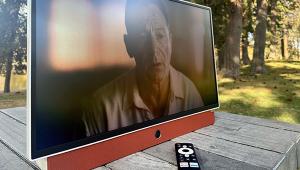For the Love of Music Page 2
"Home theater is very exciting," he intones with political correctness, and sounding a bit short of excited. "I hold the firm belief that if your system plays music accurately, it will do home theater well."
 This man keeps his heart in plain view. Halfway through our wandering discussion, Stuart pops a question to his questioner: "When are we going to talk about music?"
This man keeps his heart in plain view. Halfway through our wandering discussion, Stuart pops a question to his questioner: "When are we going to talk about music?"
It comes as a mild surprise to learn that Stuart did not grow up in a musical household. His father, an amateur guitarist, was a schoolteacher, and the family moved from Belfast so he could take a job in Birmingham when Robert was nine. Stuart doesn't recall hearing much classical music at home on the radio or on records—but he does remember the day he attended an electronics expo in Birmingham, at age 15, and heard classical music played by the BBC over some very imposing loudspeakers. "I'm sure anything that could play beyond 8kHz would have amazed me," he says. He was instantly hooked on audio. But he was already devoted to music.
"I was a very good singer as a child and performed with the grammar-school choir. I regret that I never learned to play the piano, but the love of music was always there, and by my late teens I had developed a deepening appreciation for classical music." Stuart holds a particular fondness for the ethereal music of the Estonian composer Arvo Pärt. "I wouldn't describe myself as terribly religious," the engineer says, "but Pärt's music puts me deeply in touch with my spiritual side." Stuart's tastes also run to Gilbert and Sullivan operettas and jazz—especially the Modern Jazz Quartet.
One special perk of living in Cambridge, he says, is the constant stream of live musical performances on that famous university's campus; another is access to "the best bookstore in the world." When Stuart turns to life in Cambridge, a broad grin spreads over his face. He shares life there with his American wife, Eleanor, and their daughters, Hannah, ten, and Sarah, eight. (He also has two daughters in their 20s from a previous marriage.) Twenty minutes to the north is the Meridian factory, in Huntington.
"Cambridge is a very nice city, with a large youth element that I find very appealing. You might say the university offers added value," he laughs. "We have a great time. We have family in different parts of the world, and since Cambridge is such a lovely place to be, a lot people visit us there. But we don't travel a great deal. For us, a holiday is more about being together—cycling, playing games, spending time at the beach."
Time on the job these days is devoted to what Stuart calls "building a marque—with a q!" for Meridian. "As long as interest in music persists, then building a better music-reproducing system remains relevant for us." Meanwhile, having seen his own compression scheme (Meridian Lossless Packing, or MLP) prevail as the DVD-Audio standard, he takes the long, patient view of a medium that does not show immediate signs of altering the mainstream market.
"I could see very clearly the possibility of a better recording medium," Stuart says of DVD-Audio. "I made the commitment from a passion to make a better delivery system. I just did it for the love of music."
- Log in or register to post comments






























































